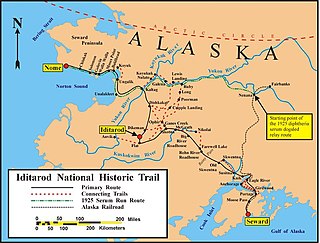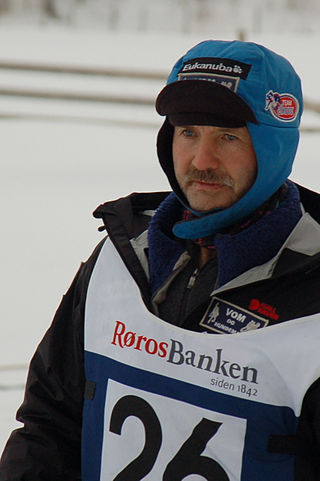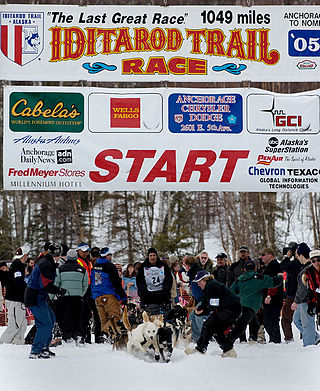
The Iditarod Trail Sled Dog Race, more commonly known as The Iditarod, is an annual long-distance sled dog race run in early March. It travels from Anchorage to Nome, entirely within the US state of Alaska. Mushers and a team of between 12 and 14 dogs, of which at least 5 must be on the towline at the finish line, cover the distance in 8–15 days or more. The Iditarod began in 1973 as an event to test the best sled dog mushers and teams but evolved into today's highly competitive race.

A sled dog is a dog trained and used to pull a land vehicle in harness, most commonly a sled over snow.

Susan Howlet Butcher was an American dog musher, noteworthy as the second woman to win the Iditarod Trail Sled Dog Race in 1986, the second four-time winner in 1990, and the first to win four out of five sequential years. She is commemorated in Alaska by the Susan Butcher Day.

The Iditarod Trail, also known historically as the Seward-to-Nome Trail, is a thousand-plus mile (1,600 km) historic and contemporary trail system in the US state of Alaska. The trail began as a composite of trails established by Alaskan native peoples. Its route crossed several mountain ranges and valleys and passed through numerous historical settlements en route from Seward to Nome. The discovery of gold around Nome brought thousands of people over this route beginning in 1908. Roadhouses for people and dog barns sprang up every 20 or so miles. By 1918 World War I and the lack of 'gold fever' resulted in far less travel. The trail might have been forgotten except for the 1925 diphtheria outbreak in Nome. In one of the final great feats of dog sleds, twenty drivers and teams carried the life-saving serum 674 miles (1,085 km) in 127 hours. Today, the Iditarod Trail Sled Dog Race serves to commemorate the part the trail and its dog sleds played in the development of Alaska, and the route and a series of connecting trails have been designated Iditarod National Historic Trail.

The Yukon Quest, formally the Yukon Quest 1,000-mile International Sled Dog Race is a sled dog race scheduled every February since 1984 between Fairbanks, Alaska, and Whitehorse, Yukon, switching directions each year. Because of the harsh winter conditions, difficult trail, and the limited support that competitors are allowed, it is considered the "most difficult sled dog race in the world", or even the "toughest race in the world"—"even tougher, more selective and less attention-seeking than the Iditarod Trail Sled Dog Race." The originator envisioned it as "a race so rugged that only purists would participate."

Jeff King is an American musher and sled dog racer. He is generally credited with introducing the sit-down sled which has largely replaced the standing sled traditionally used by distance mushers.

Robert Walter Sørlie, commonly "Sorlie" in English, is a two-time Iditarod champion Norwegian dog musher and dog sled racer from Hurdal. Together with Kjetil Backen and his nephew, Bjørnar Andersen, he forms "Team Norway", the most well-known Norwegian dog mushing team. In 2003, he became the second non-American after Martin Buser to win the 1,049-mile Iditarod Trail Sled Dog Race across Alaska, U.S. He won it again in 2005.

The ceremonial start of the 33rd annual Iditarod Trail Sled Dog Race across the US state of Alaska began in Anchorage on March 5, 2005, at 10 am AKST, and restarted in Willow the next day at 2 pm. After covering 1,161 miles (1,868 km) of wilderness, musher Robert Sørlie, an airport firefighter from Norway, crossed the finish line under the "burled arch" in Nome on March 16 at 8:39 am AKST. After taking care of his dogs, and an inspection to make sure all the mandatory equipment was in his sled, Sørlie was declared the winner by Race Marshal Mark Norman, with a time of 9 days, 18 hours, 39 minutes, and 31 seconds and won US$72,066.67 and a new truck. When asked how it felt to win a second time, Sørlie said "it feels good, I'm ready for breakfast." His team of dogs averaged 4.65 mi/h (7.58 km/h). The Red Lantern in last was Phil Morgan, an Alaska Airlines pilot, and when he crossed the finish line on March 21 at 8:02 pm AKST, the Widow's Lantern hanging on the burled arch was extinguished, which signaled the end of the race.

DeeDee Ann Jonrowe is an American kennel owner and dog musher who is a three-time runner up in the Iditarod Trail Sled Dog Race, and holds the fastest time ever recorded for a woman. She is a very popular figure in the sport, and her completion of the 1,049-mile+ race in 2003 just three weeks after completing chemotherapy for breast cancer received widespread publicity.
Emmitt Peters Sr. the "Yukon Fox", was an Alaskan American hunter, fisher, trapper, and dog musher. The last rookie to win the 1,049 mile Iditarod Trail Sled Dog Race, he and his lead dogs Nugget and Digger shattered the previous speed record by almost six days.
The ceremonial start of the 34th annual (XXXIV) Iditarod Trail Sled Dog Race across the U.S. state of Alaska began amidst the crowds of Anchorage on March 4, 2006, and the start of the competitive race, or "restart", began the next day in Willow. The race followed a modified version of the northern route for 1,151 mi (1,852 km) across the Alaska Range, through the sparsely inhabited Interior, along the Yukon River, and then up the coast of the Bering Sea to the city of Nome. Unlike in previous years, where the teams had to deal with unseasonably warm temperatures and soft, mushy snow, the weather was cold, with temperatures reported as low as −40 °F (−40 °C).

Ramy "Ray" Brooks is an Alaska Native kennel owner and operator, motivational speaker, and dog musher who specializes in long-distance races. He is a two-time runner up in the 1,049+ mi Iditarod Trail Sled Dog Race across the U.S. state of Alaska, and a former winner of the 1,000 mi (1,600 km) Yukon Quest dog sled race across both Canada and the U.S.
Dick Wilmarth was a miner and trapper from Red Devil, Alaska who won the inaugural Iditarod Trail Sled Dog Race in 1973 with lead dog Hotfoot.

Lance Mackey was an American dog musher and dog sled racer from Fairbanks, Alaska. Mackey was a four-time winner of both the 1,000-mile (1,600 km) Yukon Quest and the Iditarod Trail Sled Dog Race.
The Tustumena 200 Sled Dog Race is a dog sled race on the Kenai Peninsula of Alaska covering 200 miles. Established in 1983, the race is run each year on the last weekend in January, and has grown in reputation to draw competitive distance mushers from Alaska, the lower 48, and international locations. The Tustumena 200 boasts one of the highest purses for a dog sled race in its class. The minimum guaranteed purse is $25,000 and has been as high as $30,000. The Bogus Creek 150, a companion event to the Kuskokwim 300, based in Bethel, Alaska, has a guaranteed annual purse of $60,000.

Newton Marshall is a professional independent dogsled musher.

The Kuskokwim 300 is among the more highly regarded mid-distance dogsled races in Alaska, annually attracting some of the top mushers in the sport. The race starts and ends on the Kuskokwim River in Bethel, Alaska, and is run on and adjacent to its namesake river.

Aliy Zirkle is an American champion of sled dog racing.
Peter Kaiser is an American dog musher who won the 2019 Iditarod Trail Sled Dog Race. Kaiser is the first Yup’ik musher and the fifth Alaska Native to win an Iditarod championship. He is from Bethel, Alaska.














